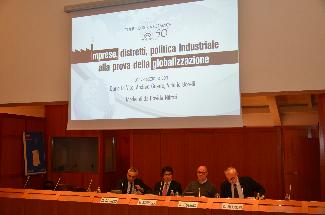 05
Dicembre
2014
05
Dicembre
2014
Businesses, clusters and industrial policy
Andrea Guerra, newly appointed advisor to Matteo Renzi, takes part in a debate with Dario Di Vico and Vittorio Borelli
As part of the programme of events organised for the 50th anniversary of the foundation of Confindustria Ceramica, a meeting was held yesterday to discuss the theme of “Businesses, clusters and industrial policy in the face of globalisation”. The meeting was moderated by Davide Nitrosi, head of the business section of QN – il Resto del Carlino, and saw the participation of the Association’s chairman Vittorio Borelli, manager Andrea Guerra and journalist Dario Di Vico. The event coincided with the launch of the book entitled “Cacciavite, robot e tablet. Come far ripartire le imprese” [“Screwdrivers, robots and tablets. How to kick-start companies”] written by Dario Di Vico together with Gianfranco Viesti and published by Il Mulino.
“Our generation of managers and entrepreneurs is the most fortunate in history because the technological revolution has given us the opportunity to reach out to 2 billion new consumers,” argued Andrea Guerra, former CEO of Luxottica and Merloni and newly appointed strategic advisor to Prime Minister Matteo Renzi. “But to be successful in this new context, companies must continue to follow the same 5 rules as ever: consider yourself an international player, create a strong bond with consumers and provide an all-round service, open up to the capital market to make investments, leverage your company’s human assets, and focus on your core business. Investing in people and technology for the production process and the market is the key to enabling our companies to compete in the global markets,” concluded Guerra.
“It is vital to have an industrial policy that can adapt rapidly to the changing conditions of the market and is able to retain the foreign investments we have succeeded in attracting to our country. For this purpose we need a banking system that is capable of interacting with businesses,” said Dario di Vico, writer and correspondent for Corriere della Sera. “In spite of our strong industrial culture, we have failed to create distribution policies that are capable of increasing the technical and emotional value of products. This is why the Italian Strategic Fund is such an important industrial policy tool for creating global competitive platforms for Italian products abroad,” concluded Di Vico.
Confindustria Ceramica’s Chairman Vittorio Borelli believes that operating as a cluster remains the winning formula for overcoming market challenges. “Our competitiveness is a result of continuous innovation along the cluster’s entire supply chain, as the range of available expertise helps to add value to Italian ceramic products and further strengthen their international leadership. We have small, medium-sized and large companies, each of which has succeeded in securing its own slice of the market. The cluster is an excellent distribution hub, but of course it must be backed by a state apparatus that supports the cluster’s companies in terms of infrastructure and eliminating red tape.”